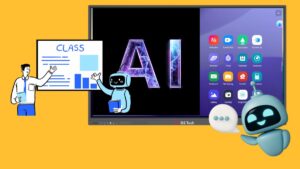Wondering if your Android-powered interactive flat panel can be upgraded to the latest version? Learn why system upgrades are often not possible and what your options are for staying up-to-date with the latest technology.
Brief Introduction
Are you wondering if your Android-powered interactive flat panel can be upgraded to the latest version of Android? Many clients ask if they can upgrade their devices running Android 8 or Android 12 to newer versions like Android 13, 14, or 15. In this blog, we will explain why it’s generally not possible to upgrade the Android system on these panels and what your options are to stay current with the latest features and security updates.
A question we often receive from clients is: “Can my Android-powered interactive flat panel be upgraded to the latest Android version?“ Whether you’re using an older model like an Android 8 or 12 system, or you’re using the latest Google EDLA interactive display devices, till November 2024, the answer is NO. The Android system version of interactive flat panels can not be updated to higher version after it is produced, including device below Anroid13 and the latest Google EDLA certificated interactive smart boards. Each Android version has a different underlying system architecture. System development and EDLA development are huge workloads, so will not upgrade.
For example, DS’s M8195 OPS computer or M9 series interactive panes, is currently Android 13. whether it can be upgraded to Android 14 or 15 in the future depends on the joint decision of the chip manufacturer MTK and motherboard manufacturer. If MTK has no plan to develop Android 15 base on same chipset,it is even less likely that interactive panels manufacturers will make an upgrade plan. so do not believe a supplier that promise you they will upgrade the Android 8 to latest Android14 or higher.For sure, I mean that it is not possible until the date of article publication. it’s crucial to understand the limitations of system upgrades for interactive panels.
In this blog, we will explain the technical aspects behind Android system upgrades for interactive flat panels, why they are often not possible, and what your options are for staying up-to-date with the latest technology.
Why Can’t My Interactive Flat Panel Be Upgraded to the Latest Android Version?
Google’s Certification Process and System Architecture
When it comes to upgrading Android systems on interactive panels, the Google official certification process plays a major role. Most Android-powered interactive panels are built on specific versions of Android that are certified through Google’s EDLA (Android Enterprise Device License Agreement) . This certification guarantees that the system meets certain standards for security, performance, and compatibility.
Once an interactive panel has been certified with a particular Android version (e.g., Android 8, 12, etc.), it is generally not possible to upgrade to a newer Android version . This is because each Android version has a different underlying system architecture —a change in architecture can significantly affect how the system operates. Upgrading would require substantial changes to the core system, which would involve a massive amount of development work , both from the panel manufacturers and Google. This level of work is typically not feasible for existing devices.
The Complexity of System Development and EDLA Certification
The process of moving from one Android version to another is not simply about installing a new operating system. The entire system—including drivers, firmware, and applications—must be redesigned to support the new Android version. Additionally, once the system is ready, it must undergo another round of EDLA certification . This certification ensures that the device continues to meet Google’s strict enterprise and security requirements.
Given the extensive development and certification efforts required, manufacturers typically do not offer Android upgrades for older models after the initial certification. So, for example, if your device came with Android 8 or Android 12, it will not be upgraded to Android 13, 14, or later unless a new device is developed with that version in mind.
Example: DS’s M8195 OPS and M9 Series Interactive Smart Boards
For example, DS’s M8195 OPS computer or M9 series interactive smart boards , which are currently running Android 13 . Whether these devices will be able to run Android 14 or 15 in the future will depend on a joint decision between the chip manufacturer (MTK) and the panel manufacturer .
If MTK, the chipset provider, does not plan to develop an Android 15 version based on the same chipset, it is unlikely that an upgrade will be available. In such cases, the only way to get a newer Android version would be to replace the hardware entirely , with a new device designed for a later Android version.
Can I Upgrade to the Latest Android Version? What Are My Options?
1. Choose Google-Certified Models
The simplest answer to upgrading to a newer Android version in the future is to choose Google-certified interactive panels . Google-certified devices are designed to meet higher standards of performance and security, and they may be more likely to receive updates in the future.
As the digital whiteboard ecosystem continues to evolve, it’s possible that future generations of interactive panels will support Android version upgrades , similar to how Android smartphones and tablets receive regular OS updates. However, this will only be true for newer models that are specifically built with upgradeability in mind.
Choosing a device from manufacturers that prioritize future upgrades can help you stay current with Android advancements as the market evolves.
2. Replace with the Latest Models
If upgrading your current interactive flat panel to the latest Android version is a must for your needs, the best option may be to replace your existing model with a newer one . Newer models are more likely to come with the latest Android versions, and they may even come with hardware designed to support future updates.
Many manufacturers release new models with improved performance, better features, and the latest Android versions. By upgrading to one of these devices, you can ensure that your interactive panel will be able to handle newer applications, security patches, and performance enhancements as they become available.
Conclusion: What’s the Best Option for Your Interactive Panel?
While it’s understandable to want the latest features and updates, the reality is that upgrading your existing interactive flat panel to a newer Android version is often not feasible due to the certification process and the differences in system architecture between Android versions.
Here are your best options:
1. Choose a Google-certified model for future-proofing, as these are more likely to receive Android updates as the ecosystem improves.
2. Replace your current model with the latest device to take advantage of newer Android versions and enhanced performance.
At the end of the day, upgrading the system is not as simple as clicking “update.” To keep your interactive panel running smoothly with the latest features and security patches, it’s often necessary to invest in newer hardware designed for the latest Android versions.
#Android Upgrade Interactive Panel #Google Certified Android Panels #Interactive Flat Panel #Android System Upgrade for Interactive Displays #Interactive Smart Board Android Upgrade





